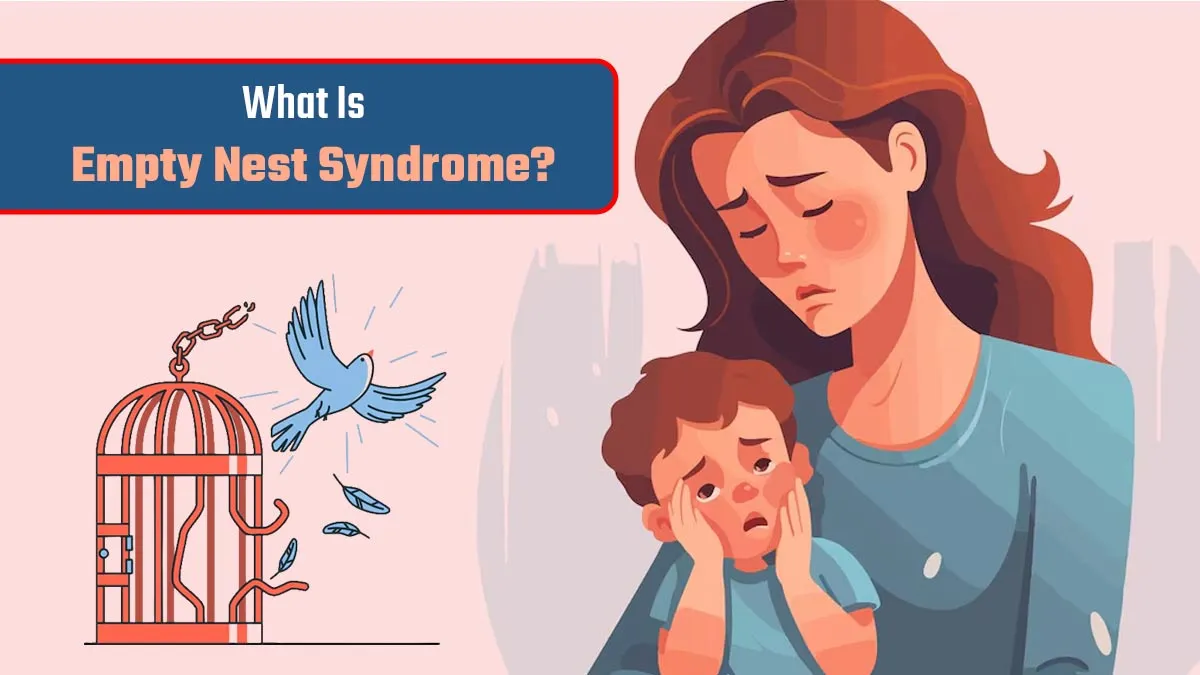
As children grow up and begin to forge their paths, parents often face a significant emotional transition known as empty nest syndrome (ENS). This phenomenon occurs when children leave home for various reasons such as attending college, starting a job, or getting married leaving parents to adjust to a quieter household. While this stage can be a time of pride and joy as parents witness their children’s independence, it can also evoke feelings of sadness, loss, and confusion.
Table of Content:-
CHECK YOUR
MENTAL HEALTH

Regarding the same, we reached out to an expert, who detailed the emotion a woman feels. While it is not classified as a clinical condition, the emotional impact can be significant and long-lasting. Understanding the causes, symptoms, and coping strategies can help parents navigate this transitional phase more effectively.
What Is Empty Nest Syndrome?
Nanda Botadkar, Business Coach, Nurturing Business, Mumbai explained the condition that makes mothers feel a bit lost. “Many women dedicate their entire lives to their children, believing that caring for them is their sole purpose in life. But when the kids leave, it creates a deep void, bringing loneliness, identity loss, and even health issues,” she said. The expert added that it can also overwhelm young adults, making them feel responsible for their parent’s emotional well-being. It also brings impatience and resentment among the individuals.
Empty Nest Syndrome Causes
The phenomenon arises from various factors that influence a parent's emotional state when their child leaves home.
- Identity Shift: Many parents derive a significant portion of their identity from their role as caregivers. The departure of their child can lead to feelings of emptiness or loss of purpose.
- Relationship Dynamics: Parents in unstable or unsatisfactory marriages may find the absence of children exacerbates feelings of loneliness and grief.
- Coping with Change: Individuals who struggle with change may find it particularly challenging to adapt to an empty nest.
- Life Stressors: Concurrent life events, such as retirement or health issues, can compound feelings of loss when a child moves out.
Empty Nest Syndrome Symptoms
-1738571620086.jpg)
According to a study, parents going through empty nest syndrome were more likely to experience mild depression than moderate or severe depression. This highlights the emotional challenges that parents face during this time of change. The symptoms may vary widely among parents but often include the following characteristics.
- Emotional Distress: Parents often feel sad, anxious, or grief-stricken as they adapt to their new situation.
- Loss of Purpose: Many parents struggle with feeling unneeded or unsure of their role now that their children are independent.
- Concern for Child's Well-being: Worries about whether their child can handle life alone can increase parents' anxiety.
- Social Isolation: Some parents may feel isolated from friends or family who don’t understand what they’re going through.
ALSO READ: Are Fast Walkers More Stressed? Study Answers Do Depressed People Walk Slower
Coping Strategies for Parents
The expert suggested coping strategies to deal with empty nest syndrome.
- Accept and acknowledge your feelings. It’s okay to grieve.
- Take action so you don’t end up in a downward spiral.
- Put down your thoughts, that is journal them for clarity.
- Find a new purpose that is fulfilling for you. Volunteer, mentor, or start something meaningful to you!
- Pursue passions, hobbies, or new goals to rediscover yourself.
- Start prioritising self-care. Make yourself the most important person in your own life.
- Exercise and try guided meditation.
- Reconnect with your spouse and friends. Rebuild and Strengthen your old relationships.
- Stay connected but give space to your kids. Trust that your kids will manage their lives.
“This is not an end we can make it’s a new beginning. Life has so much more to offer us” said Nanda aiming to support the new versions of individuals.
Conclusion
Empty nest syndrome is a natural emotional response that many parents face when their children leave home. By recognising the causes and symptoms, parents can implement effective coping strategies to navigate this transition. Embracing communication, pursuing personal interests, seeking support, reframing perspectives, and creating new routines are essential steps in adapting to this new chapter in life. Ultimately, while the experience may be challenging, it also presents an opportunity for growth and renewal in the lives of parents.
Also watch this video
Read Next
Internet Claims ADHDers Find Constant Ringing Sounds Calming for Better Focus: Expert Weighs In
How we keep this article up to date:
We work with experts and keep a close eye on the latest in health and wellness. Whenever there is a new research or helpful information, we update our articles with accurate and useful advice.
Current Version